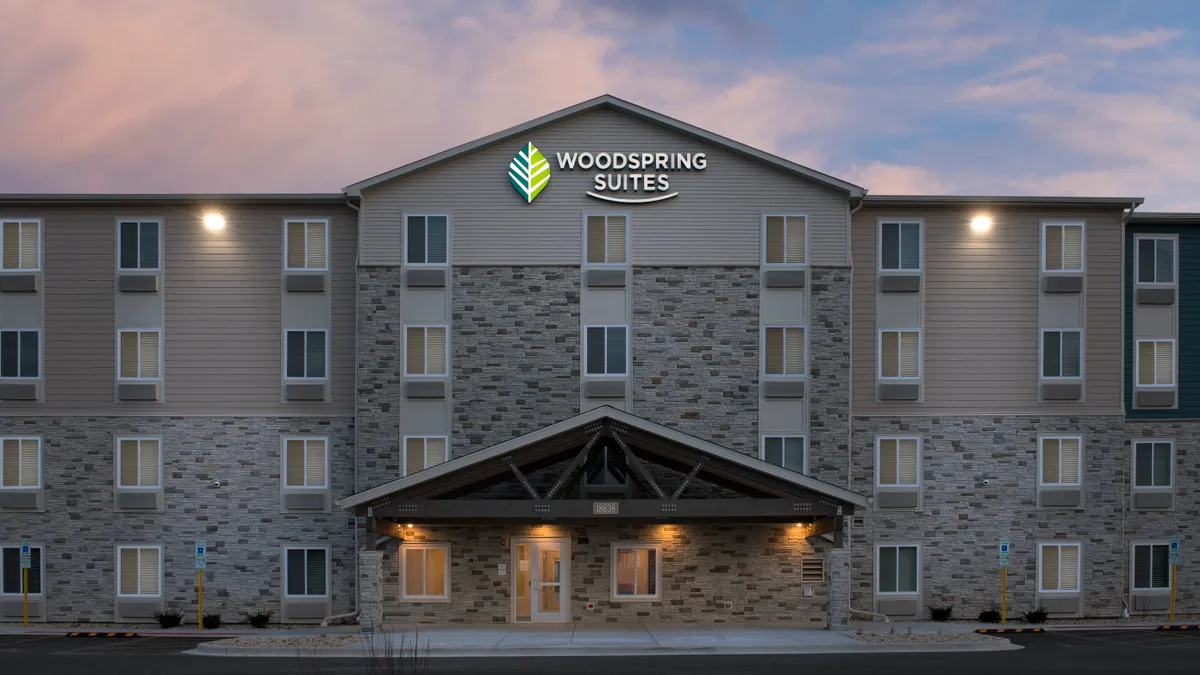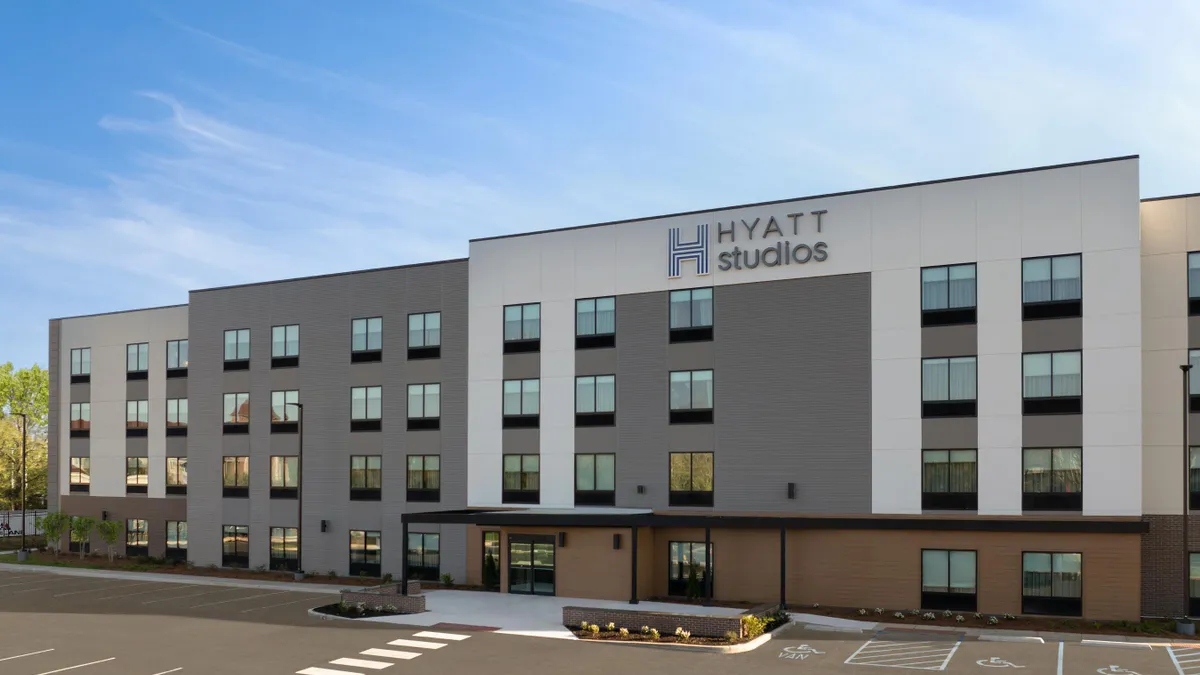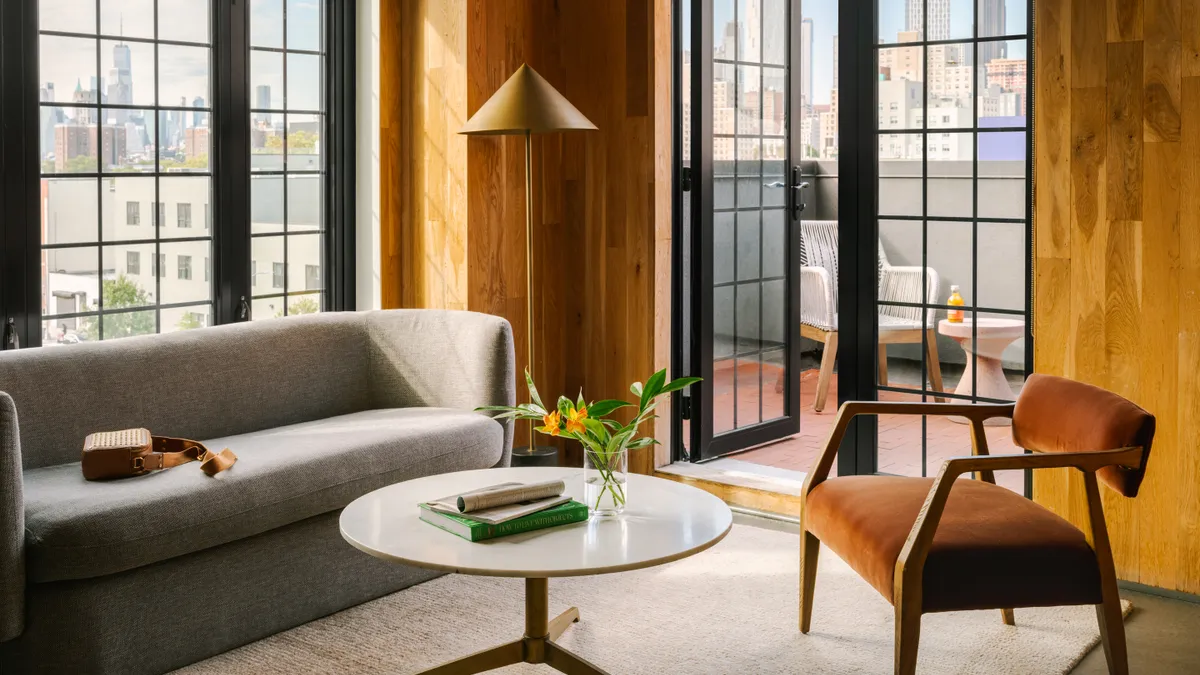In May, WoodSpring Suites broke a brand record: It opened six hotels in one month, including its first property in the state of New York.
The extended stay brand, owned by Choice Hotels International, also opened hotels in Texas, Virginia, Illinois, Florida and California that month, bringing WoodSpring Suites’s total openings to 12 so far in 2023, the company told Hotel Dive.
Since its acquisition by Choice in 2018, WoodSpring Suites has grown substantially, with more than 200 locations across the country and a pipeline that expanded by 68% from 2021 to 2022 alone.
The brand’s acceleration exemplifies an increased demand for extended stay options among investors, developers and consumers, particularly in the economy segment.
But as the economy brand grows, it will face competition from other hotel chains looking to capitalize on the extended stay segment’s momentum.
The extended stay promise
An extended stay hotel provides accommodations for longer-term guests. The rooms generally feature separate eating, living and sleeping areas designated by furniture, as well as a kitchen space with a refrigerator, microwave, cooktop and dishwasher where guests can prepare their own meals.
An extended stay product, particularly one in the economy segment, also includes less community amenity space and daily services like housekeeping. Because of this, extended stay properties can operate more efficiently than some select-service models, and that attracts developers, Lodging Econometrics Senior Vice President Bruce Ford told Hotel Dive.
Matt McElhare, senior director of Choice’s extended stay brands, told Hotel Dive that developers could increase their gross operating profit by from 10% to 15% when investing in extended stay versus the average select-service hotel.
“The average select-service hotel typically will do between 35% and 40% gross operating profit margins, while extended stay, especially in economy, but even midscale, [generates] on average about 50%, and our WoodSpring brand last year was over 60%,” McElhare said.
In addition to increased profits, investors and developers are also drawn to the stable occupancy that extended stay properties, particularly economy ones, can maintain, McElhare noted.
In 2021, WoodSpring Suites saw record performance, Choice said, with 230 consecutive days over 80% occupancy and RevPAR up 18% compared to the same time in 2019. Last year, WoodSpring Suites had a 77% occupancy rate, slightly outpacing the national average of 76.1% for the economy segment, according to Choice.
The increase in occupancy at extended stay hotels is in part a result of consumers’ changing lifestyle and travel behavior following the pandemic, according to Anna Scozzafava, vice president and general manager of extended stay brands at Choice.
Demand for extended stay hotels from those in occupations such as nursing or construction that existed pre-pandemic did not waver when COVID-19 hit, Scozzafava said, adding “Our hotels were full.” Instead, a different type of traveler — remote workers looking for longer stays and more individualized accommodations — emerged.
Additionally, extended stay hotels have become a short-term housing option for many due to a lack of available rental options in a lot of major cities, Ford said.
Because of the stable occupancy levels of economy extended stay hotels (what Lodging Econometrics categorizes as lower-tier), banks are more willing to provide attractive financing for their new construction, Ford said. This has made the product type a feasible, and even desirable, new construction option for developers, at a time when many are steering away from new projects due to an uncertain financial climate.
Creeping competition
There are 172 lower-tier extended stay development projects in the pipeline this year, with the majority of them (66%, or 114 projects) being WoodSpring Suites, according to Lodging Econometrics data obtained by Hotel Dive. Choice said there are 300 total WoodSpring Suites hotels in its pipeline, which extends beyond 2023.
While WoodSpring Suites appears to lead in economy extended stay development, Lodging Econometrics data shows several other hotel brands, including Wyndham’s Echo Suites, Red Roof Inn’s HomeTowne Studios and Motel 6’s Studio 6, are currently underway on projects in the lower-tier category.
Wyndham launched Echo Suites in 2022 and, earlier this year, announced it has 200 hotels in the total pipeline. Lodging Econometrics data shows 16 are currently planned for this year.
In the middle-tier segments, there are 1,247 extended stay developments in the pipeline for 2023, according to Lodging Econometrics. Home2 Suites by Hilton makes up the majority of projects in this category, with 546 hotels, or 56,001 rooms, underway or planned.
On the heels of Home2 Suites’ expansion, Hilton announced last week the addition of a new lower-midscale extended stay brand to its portfolio, dubbed Project H3. According to Matt Schuyler, chief brand officer at Hilton, the new brand will “disrupt the category and allow Hilton to better provide reliable and friendly service for those who are in it for the long stay.”
Choice’s growth outlook
Despite the competition in the extended stay arena, Scozzafava said Choice is focused on its five-year head start.
“There's been a number of competitors that have announced either new brands or their intention to enter the space, and there is a large pool of demand that is out there from the guest side. We [will focus on] being able to bring to bear all of our expertise and what we have to offer from a Choice extended stay perspective, with our dedicated resources, the infrastructure that we have and our proven operating model and proven profitability.”
Choice’s extended stay development pipeline isn’t expected to slow down any time soon. According to Scozzafava, the company’s entire extended stay portfolio, spanning multiple brands and segments, is projected to grow by 15% annually for the next five years.
The company is exploring bringing the economy product to various new markets that show positive growth fundamentals, including upstate New York, several New England cities, Montana and Idaho, Ron Burgett, senior vice president of extended stay development at Choice Hotels, said. Choice Hotels will also continue expanding in states like Florida, which have embraced the hotel model, Burgett said.
For its extended stay hotels in the midscale segment, Choice recently debuted a “Premium Kitchen in a Box” model, which allows franchisees to convert almost any transient hotel into an extended stay MainStay Suites property. It’s also underway on several Everhome Suites properties, Burgett said. Lodging Econometrics data shows there are 19 Everhome properties in the pipeline for this year.


















